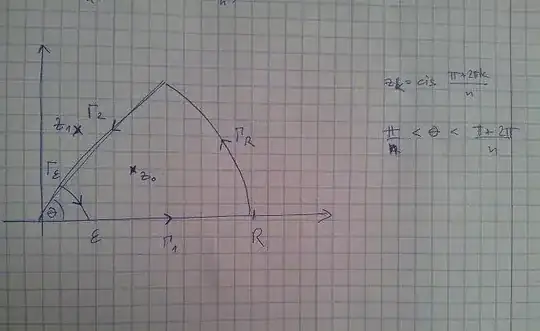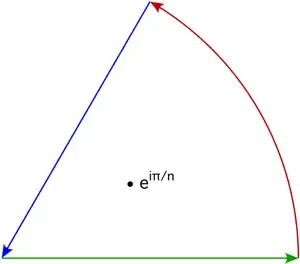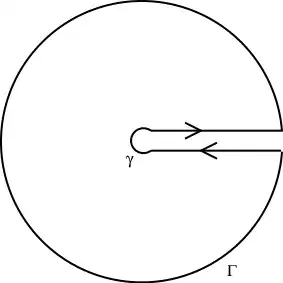I need to calculate $\int_0^{\infty}{\frac{\ln x}{1+x^n}}$ $,n\geq2$ using complex analysis. I probably need to use the Residue Theorem.
I use the function $f(z)={\frac{\ln z}{1+z^n}}$ in the normal branch.
I've tried to use this contour.

Where $\theta$ is an angle so that only $z_{0}$ will be in the domain (I hope this is clear from the drawing)
I estimated $|\int_{\Gamma_{R}}|$ and $|\int_{\Gamma_{\epsilon}}|$ and showed that they must tend to $0$ when $\epsilon \rightarrow0$ and $R \rightarrow\infty$. (Is it true?)
However I'm having trouble calculating $\int_{\Gamma_{2}}$ . Does it have something to do with choosing the "right" $\theta$?
Any ideas?
Thanks!
UPDATE
After Christopher's comment I chose $\theta=\frac{2\pi}{n}$ which gives, after the paramatrization $\Gamma (t) = te^{\frac{2\pi i}{n}}$, $t\in(\epsilon,R)$:
$$\int_{\Gamma_{2}}{\frac{\ln z}{1+z^n}dz} = \int_{\epsilon}^{R}{\frac{\ln (te^\frac{2\pi i}{n})}{1+t^n}e^\frac{2\pi i}{n}dt} = e^\frac{2\pi i}{n}\int_{\epsilon}^{R}{\frac{\ln t}{1+t^n}dt} + ie^\frac{2\pi i}{n}\int_{\epsilon}^{R}{\frac{\frac{2\pi}{n}}{1+t^n}dt} =$$ $$ = e^\frac{2\pi i}{n}\int_{0}^{\infty}{\frac{\ln t}{1+t^n}dt} + ie^\frac{2\pi i}{n}\int_{0}^{\infty}{\frac{\frac{2\pi}{n}}{1+t^n}dt} $$
But I have no idea how to deal with the second integral.

